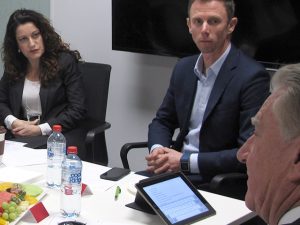Changing licensee is no small or simple matter and requires a good deal of preparation and determination to see the process to completion.
It also requires asking some questions around what a life insurance business is and what it can be in the future, as Evalesco director, Jeff Thurecht writes in this account of his business changing licensee.
As Jeff recalls, asking the right questions, even of a current licensee, is essential in ensuring a business will be able to operate with the best support into the future.
The decision to change licensee is a big one. It has the potential to have a significant impact on the long-term success of your business as well as creating major short-term disruption. We’ve just changed licensee for the first time in 10 years, so it’s fair to say it wasn’t a decision we made lightly. As such, I would like to share the key points that impacted our decision, the questions we asked and the lessons we’ve learnt. I’ll break it down into two distinct sections. The first is choosing a new licensee and the second is making the move.
Choosing a new licensee
With so many options available it can be confusing and challenging to work out where to start. We started by looking at our own business. The areas we considered to start with were along the lines of:
- What stage of the business life cycle is our business at? Is growth the focus? Or consolidation?
- What are our goals for our business?
- What are the challenges we’re currently experiencing?
- What do we need help with to achieve those goals or overcome those challenges?
For example, some of the specific questions we asked included:
- Do we need assistance in building out our client proposition, or implementing a new fee model?
- Is succession planning a short to medium term focus?
- Would our business benefit from a lot more referrals or introductions to centres of influence?
- Is improving efficiency in our business a key focus?
For us, efficiency was the key issue we wanted to address.
We set the agenda and kept them on track because we knew what we were looking for, had narrowed down the candidates and didn’t have to put up with the standard beauty parade and fast talk
Once you have a clear understanding of the priorities for your business it can be easier to work through the next step and to consider what you really need and want from a licensee?
Different licensees offer a range services and areas of focus but there are usually a number of consistencies. The next list of questions included:
- Do we need or want practice development support (such as a BDM/PDM)? How much support would we require from this source?
- Are we looking for a highly systemised process and client offering that we can effectively plug into our business?
- Do we want the licensee to provide software?
- Is technical support an important consideration?
- Would we rather be left alone as much as possible to get on with business?
- Do we have the resources to take more on ourselves or should we seek those resources independently?
- Are we really doing things very differently than most other businesses?
In answering questions across those areas we felt well on our way to filtering out some of the possibilities. This also helped us frame a wish list and the key criteria so that we could be really clear about what we want in discussions with any prospective licensees.
The next step was to have conversations with a short list of prospective new licensees and ask them to address our key criteria. We set the agenda and kept them on track because we knew what we were looking for, had narrowed down the candidates and didn’t have to put up with the standard beauty parade and fast talk.
That exercise led us to a decision between three options. For the final stage we drilled down a little bit further by considering:
- Are there other businesses like ours at the licensee? If not, what’s the strategic reason that they’ll be a good fit? It could be that they’re an investment focused licensee who are looking for a great risk business to refer too?
- Does the licensee have distribution agreements and good relationships with our preferred insurers? (Assuming a broad, open APL of course.)
- What were all of the licensee’s key policies and procedures? We asked questions, pushed back and negotiated on any points we weren’t sure about or disagreed with, before making a decision and signing on the dotted line.
- What kind of feedback is there in the market? We talked to as many people as we could who are in the licensee, have been in it or know about it and got their thoughts. As we all know, there are lots of opinions in financial services, so we didn’t take any as gospel, more as a guide to our decision making.
- What about PI? We got a thorough understanding of their PI policy and how they charge for it.
The final point we considered, as we weren’t desperate to escape and still had a good relationship with our current licensee, was to do a thorough audit of the current licensees offer. In fact, this was their idea, and one I’m pleased we did.
Sometimes, when you’ve been there for a while, you both take each other for granted. They may have added new services or resources, or have things in the pipeline that they haven’t shown you or you’ve forgotten about.
No one likes moving house or office and I’m afraid to say there are some correlations in moving licence. It hasn’t been a bad experience for us, so far, but it is certainly not one I’d like to do too often
The current licensee effectively pitched us as they would to a new prospect. With the added benefit that we already had a trusted relationship with them so we could all be really open. Just think, with this step, who knows maybe we don’t have to go through the pain of moving.
Then we made the call on our new license.
Making the move
It’s time to book the removalist. No one likes moving house or office and I’m afraid to say there are some correlations in moving licence. It hasn’t been a bad experience for us, so far, but it is certainly not one I’d like to do too often. To ease the pain there are a few things we planned for and put into action.
To start off, we provisioned for a period of time without any revenue – up to 3 months. It would be a bad outcome to not receive any revenue for 3 months but it does take time to process transfers, and different licensees may consider different arrangements for processing ongoing commission statements. That is, some might cut you off quickly. It’s much better to have a bit of cash in the bank just in case. We were fortunate that this is still being very well handled by our old licensee.
Also, we expect to have a similar period of time where we will write no new business, or a limited amount. Given we have a number of advisers who we’ve managed to keep away from the transition and focused on seeing clients, this hasn’t been a major issue for us either. But, depending on the structure of your business and the resources you have to support the move, you or your client facing, business writing advisers, may have to focus on making the transition over writing new business. It pays to be prepared.
Then there’s the administration. As with everything to do with risk advice, there is a lot of administration that goes into changing licence. In completing the application with the new licence make sure you have copies or access to evidence of all of your education and CPD, compliance audit reports, breach registers and conflicts registers. I had to search high and low for some of my details after a long time at the one licensee.












